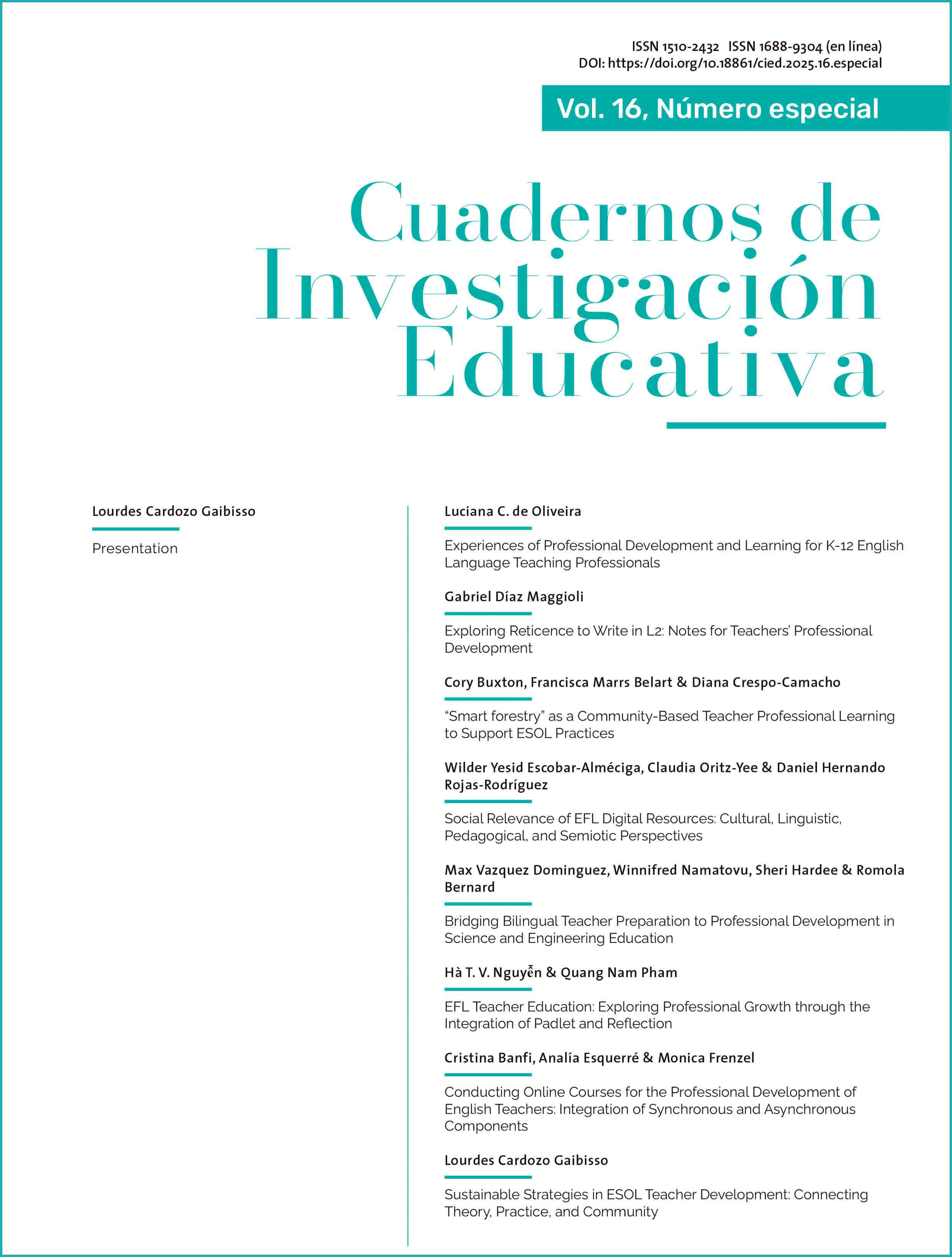Estratégias sustentáveis no desenvolvimento de professores de ESOL
conectando teoria, prática e comunidade
DOI:
https://doi.org/10.18861/cied.2025.16.especial.4226Palavras-chave:
desenvolvimento profissional sustentável de professores, TESOL, engajamento comunitário, salas de aula multilíngues, política educacionalResumo
Este artigo examina abordagens sustentáveis para a formação profissional de professores de ESOL (Inglês para Falantes de Outras Línguas), que integram, de forma eficaz, teoria, prática e envolvimento comunitário para promover um crescimento de longo prazo e um impacto positivo. À medida que as salas de aula se tornam cada vez mais multilíngues e diversificadas devido à globalização e aos avanços tecnológicos rápidos, é fundamental que o desenvolvimento profissional dos professores seja abrangente, adaptável a diferentes contextos e profundamente enraizado nos ecossistemas comunitários. Essa abordagem garante que os professores estejam equipados com as habilidades e os conhecimentos exigidos para atender às necessidades cambiantes dos estudantes, fomentando um ambiente de aprendizagem inclusivo e solidário. O artigo apresenta várias estratégias eficazes, incluindo a formação de comunidades de aprendizagem, programas de mentoria, iniciativas de pesquisa-ação e práticas baseadas no ambiente local. Essas metodologias ajudam a reduzir a distância entre pesquisa e prática, promovendo experiências autênticas em sala de aula. Além disso, aborda os desafios comuns, como resistência ideológica, limitações de recursos e barreiras sistemáticas nas instituições de ensino. Para enfrentar esses problemas, o documento oferece recomendações para formular políticas, desenvolver lideranças e promover iniciativas comunitárias. Em suma, reforça que a aprendizagem profissional sustentável em ESOL exige colaboração contínua e compromisso de todos os envolvidos para criar um ecossistema educacional resiliente e inclusivo, beneficiando professores e alunos no longo prazo.
Downloads
Referências
Allexsaht-Snider, M., Buxton, C., Hernandez Rodriguez, Y., Cardozo-Gaibisso, L., Cohen, A., & Lu, Z. (2016). Crosscutting findings and recommendations for research and practice in teaching science with emergent bilingual learners. In C. Buxton & M. Allexsaht-Snider (Eds.), Supporting K-12 English Language Learners in Science: Putting Research into Teaching Practice (pp. 209-240). Routledge.
Azano, A. P., Brenner, D., Downey, J., Eppley, K., & Schulte, A. K. (2020). Teaching in rural places: Thriving in classrooms, schools, and communities. Routledge.
Buxton, C., Allexsaht-Snider, M., Hernandez, Y., Aghasaleh, R., Cardozo-Gaibisso, L., & Kirmaci, M. (2017). A design-based model of science teacher professional learning in the LISELL-B project. In A. Oliveira & M. Weinburgh (Eds.), Science Teacher Preparation in Content-Based Second Language Acquisition (pp. 179-196). Springer.
Cardozo-Gaibisso, L., & Harman, R. (2019). Preparing In-Service Teachers to Work with Linguistically and Culturally Diverse Youth: Lessons Learned and Challenges Ahead. In G. Onchwari & J. Keengwe (Eds.), Handbook of Research on Engaging Immigrant Families and Promoting Academic Success for English Language Learners (pp. 361-377). IGI Global.
Cardozo-Gaibisso, L., Vazquez Dominguez, M., Allexsaht-Snider, M., & Buxton, C. (2018). La escolarización interrumpida: Perspectivas pedagógicas de educadores trabajando con adolescentes bilingües refugiados en Estados Unidos. Cuadernos de Investigacion Educativa, 9(1). https://doi.org/10.18861/cied.2018.9.2.2856
Cardozo-Gaibisso, L., Vazquez Dominguez, M., Buxton, C., & Harman, R. (2022). ¿Qué valoran los que enseñan? Aportes para el aprendizaje de ciencias en contextos bilingües a través del discurso docente. Cuaderno de Pedagogía Universitaria, 18(36), 7-26.
Cardozo-Gaibisso, L., Vazquez Dominguez, M., Harman, R., & Buxton, C. (Eds.). (2024). Pedagogies for Equitable Access: Reimagining Multilingual Education for an Uncertain World. Information Age Publishing.
Coady, M. R., Golombek, P., & Marichal, N. (Eds). (2023). Educating multilingual learners in rural schools: Illuminating diversity in rural communities in the United States. Brill.
Darling-Hammond, L., Hyler, M. E., & Gardner, M. (2017). Effective teacher professional development. Learning Policy Institute.
de Oliveira, L. C. (2023). Supporting multilingual learners’ academic language development: A language-based approach to content instruction. Routledge.
de Oliveira, L. C., Braxton, D., Gui, J., & Willging, T. (2023). A critical dialogue among participants in a professional learning community. In C. C. Lin & C. Bauler (Eds.), Reimagining dialogue on identity, language and power. Multilingual Matters.
Fackler, A. K. (2024). “I Thought That They Were Very Cut and Dry”: Preservice Elementary Science Teachers Learning About and Learning with Models and Modeling. Journal of Science Teacher Education, 36(2), 180–202. https://doi.org/10.1080/1046560X.2024.2380549.
Fackler, A. K., & Harman, R. M. (2025). Empowering Elementary Preservice Science Teachers: Harnessing Diverse Language Resources in the Practice of Modeling. Science Education, 109(3), 796-815.
Hora, M. T., Bouwma-Gearhart, J., & Park, H. J. (2017). Data driven decision-making in the era of accountability: Fostering faculty data cultures for learning. The Review of Higher Education, 40(3), 391-426.
Garrison, D. R., Anderson, T., & Archer, W. (1999). Critical inquiry in a text-based environment: Computer conferencing in higher education. The Internet and Higher Education, 2(2-3), 87-105.
Gruenewald, D. A., & Smith, G. A. (Eds.). (2014). Place-based education in the global age: Local diversity. Routledge.
Johnson, N. (2021). Researching online communities of inquiry through digital ethnography. In SHS Web of Conferences (Vol. 102, p. 01006). EDP Sciences.
Saud, M. S., & Mahara, K. K. (2024). Exploring the Factors Influencing the Professional Development of Secondary English Language Teachers. English Language Teaching Perspectives, 9(1-2), 41-50.
Vaillant, D., & Cardozo-Gaibisso, L. (2017). Desarrollo profesional docente: entre la proliferación conceptual y la escasa incidencia en la práctica de aula. Cuaderno De Pedagogía Universitaria, 13(26), 5-14. https://doi.org/10.29197/cpu.v13i26.259
Wagner, P. A. (2020). Establishing a community of inquiry. Creative Education, 11(7), 1047-1054.
Wenger, E. (1999). Communities of practice: Learning, meaning, and identity. Cambridge University Press.
Widiastari, N., & Fithriani, R. (2024). Teachers’ Practices of Reflective Teaching in EFL Classroom. IJORER: International Journal of Recent Educational Research, 5(3), 679-689.
Downloads
Publicado
Como Citar
Edição
Seção
Licença

Este trabalho está licenciado sob uma licença Creative Commons Attribution 4.0 International License.





